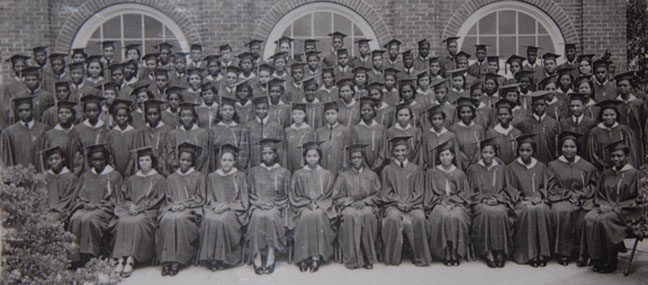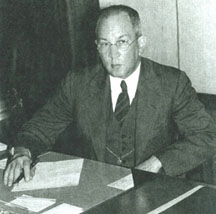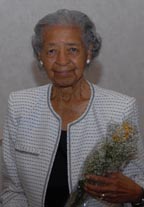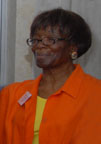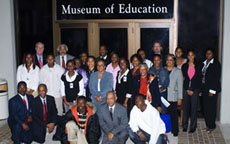

Dudley High School, |
||||||||||||||||||||||
In 1940, Dudley High School was invited to participate in the Association of Colleges and Secondary Schools for Negroes’ Secondary School Study. Selected and funded by the Rockefeller Foundation, sixteen of the most distinguished black high schools in the United States participated in an experimental program to reexamine administrative, curricular, and instructional practices. The University of South Carolina’s Museum of Education is pleased to feature Dudley High School and its participation in the study. |
||||||||||||||||||||||
“Dr. Tarpley and his wife, Lucille, had no birth children, but they were parents to thousands of the students who went through Dudley High School.” |
||||||||||||||||||||||
|
Letter of Invitation to Participate in the Study January 23, 1940 |
|||||||||||||||||||||
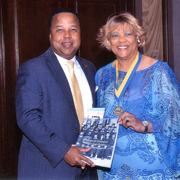 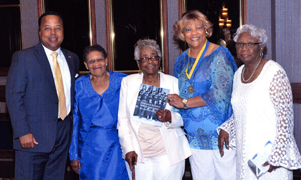 Research participants presenting a copy of the Secondary School Study catalog to the Dudley High School's Media Center, 2016 |
||||||||||||||||||||||
While the Association sought to achieve accreditation for its member schools and to make strides for equitable support—separate AND equal—for black education, some educators believed teachers were not involved in progressive education’s “stream of educational ideas” and, thus, were placing too much emphasis on traditional instructional practices. For this reason, the Rockefeller Foundation invited distinguished schools to help define promising practices and to serve as a laboratory for determining goals for black youth. |
||||||||||||||||||||||
|
||||||||||||||||||||||
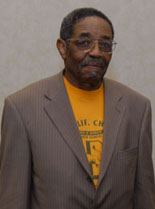 William Skelton |
|
|||||||||||||||||||||
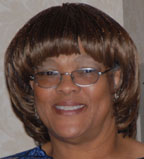 Brenda Dalton James |
||||||||||||||||||||||
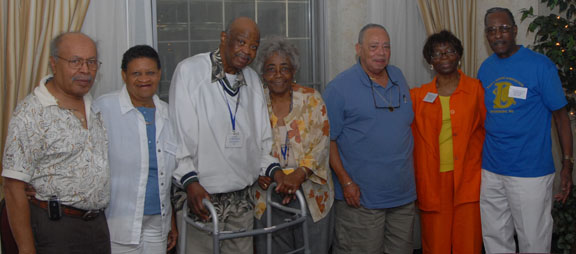 members of the class of 1946 (l-r): George M. Hampton, Mary Katherine Williamson Jones, John Smith, Helen Smith, Arthur M. Cole, Carrie Harris Outlaw, and James H. Kesler |
||||||||||||||||||||||
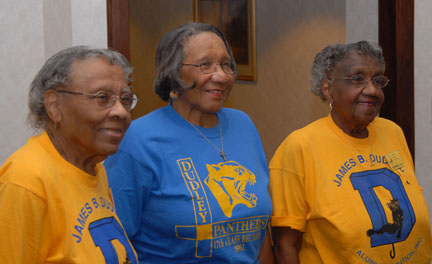 and Lois Clark Millings, Almetha Clark Gilbert, and Bernice Clark Brown |
||||||||||||||||||||||
With appreciation to Gloria Pitts, archivist of the F.D. Bluford Library at North Carolina Agricultural and Technical State University, and Andre' D. Vann, archivist of the James E. Shepard Library, North Carolina Central University. |
||||||||||||||||||||||
|
||||||||||||||||||||||
| “Mr. Tarpley and the teachers were invested in making certain that we did well. They were proud of us, and we were proud of them. I came to Dudley as a child and I went away as an adult thanks to the teachers at Dudley High School.” Carrie Harris Outlaw | ||||||||||||||||||||||
“Dudley High School was an enriching experience for me and made me an academician; the teachers changed my life and showed me the importance of learning.” George M. Hampton |
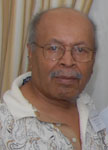 George M. Hampton |
|||||||||||||||||||||
The Museum of Education’s Web Exhibitions have been prepared for a general audience and have not used professional terminology from the field of education. Our accounts are intentionally free of detailed bibliographic citations. The curator is currently writing a scholarly account of this project that follows accepted bibliographic practices. |
||||||||||||||||||||||
The Museum of Education’s Web Exhibitions center primarily on the academic life of individual schools during the 1940s and early 1950s, the focus of the Secondary School Study. Our vignettes serve not to lessen the accomplishments and accolades from prior or subsequent decades nor do they diminish the significance of the social and athletic dimensions of school life. Instead, the Museum presents web exhibitions of the Secondary School Study schools as a way to feature the experimental efforts of progressive educators during the 1940s. Since these vignettes were not prepared to serve as school histories, we encourage alumni and historians to prepare their own comprehensive school accounts, histories, and memoirs of these important educational institutions. Further, these exhibitions are conceived within a tradition of progressive education where a fruitful experience raises as many questions as it answers. Thus, the information on the various sites has been crafted intentionally to be suggestive—to allow important questions "to float" through the exhibitions rather than to be answered with questionable certainty. These sites are works-in-progress and represent an "educational research charrette" as additional historical material is discovered and fresh memories, recollections, and insights come forth by participants and other researchers. |
 |
|||||||||||||||||||||

an institutional member of the International Coalition of Sites of Conscience
Museumofed@gmail.com

